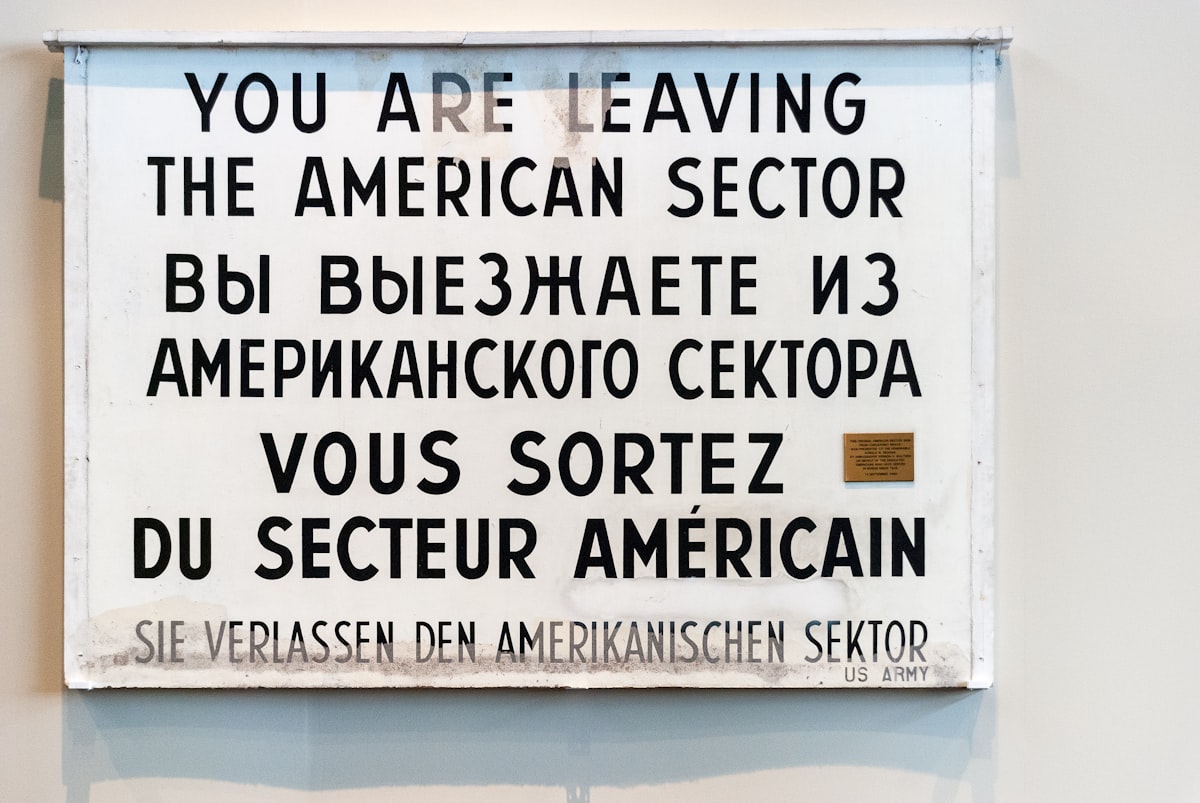CIA Deputy Director Jennifer Ewbank Sits Down With Rebellion Research

RR:
Is America safe today?
CIA Deputy Director Jennifer Ewbank:
That's actually a really good question. That's what the CIA was created to do. We were created in the wake of World War 2 to help avoid strategic surprise. And we do like to say that we are America's first line of defense, often invisible, but first line of defense. And so if I think about safety, I want to frame it in some other terms.
So despite all of our best efforts in that post war period, we all experienced the horror of 9/11 and that became a real catalyst for a tremendous change in the national security community and across the U.S. Government.

And so to the question of “are we safe?” At the least, I'm delighted to highlight that we have not had a major international terrorist attack on the homeland since that time. And so that is two decades of pretty significant success in the counterterrorism fight.

We might ask ourselves whether we're prepared for the most significant shift in the national security landscape in our lifetimes, and that is the rise of the People's Republic of China, an adversary with global aspirations and the resources to achieve those aspirations.
And so instead of safety, I wonder if we might spend a couple of moments and talk about complexity, because that's really the space we're in today, and in any case, safety isn't the absence of threats. It is mitigation of threats and managing risk. And that's just another definition for the CIA’s core business.
So we could say that our national security landscape is perhaps more complex than ever. Just just think about the last few months: Russia launched an unprovoked and illegal war on its neighbor, tensions across the Taiwan straits are probably higher than any time in recent memory, and for certain North Korea has declared that that it is willing to deploy a nuclear deterrent in the event of any sort of military confrontation.
Iran, if we believe all the press reports, has a nuclear breakout timeline that is effectively zero. Terrorists continue to plot against our homeland and against our allies around the world, and there are all the regional conflicts that continue to pop up and demand our attention. And so with all of that going on, I go back to what I said, that China presents the most significant national security challenge for the United States in the 21st century.

So unlike the Soviet Union during the Cold War, which is when I joined government service, China is trying to compete across every domain including diplomatic, political, economic, military, cultural and technological. So I wanted to mention all that because you've got this really dynamic environment out there.
What has changed the entire equation has been the rapid advance in technological development over the past decade or two. And that technology, largely digital but not exclusively, is something leveraged by every single one of those challenges that I've mentioned. We've got this dynamic environment with the challenges of new technologies which are both a strength for America as we are tremendous innovators and creators but has also made us more exposed and more vulnerable than ever. Think about the obvious things like a cyber attack, an obvious threat, but also consider the subtle threat from a foreign adversary of efforts to manipulate public opinion through social media.
These are all the things we've got to grapple with today and they all suggest that we need to raise our overall digital acumen to strengthen our resilience in the face of adversaries who are really going to be leveraging these technologies aggressively against the United States.
RR:
You mentioned 9/11. I know that was a great catalyst for many people to join the public service. What was the inspiration for you?

CIA Deputy Director Jennifer Ewbank:
Thanks. I joined government service during the Cold War. And I joined out of a sense of patriotism, dedication to my country. These days, at least in the more cynical conversations you see in the media, that all seems a little bit corny, but that's what I felt at the time.
I began my career in the Foreign Service, which is within the Department of State, thinking that my educational background, my travels overseas and my foreign language ability would all be suitable for a career in diplomacy and I did really enjoy it. But as I said, I joined during the waning years of the Cold War, determined I was going to fight international communism as promoted by the Soviet Union.
With the Cold War over, I found myself drawn to the CIA and it turned out to be in fact my calling and I joined the Directorate of Operations as it is really relevant to how we lead the new digital mission at CIA.
The Directorate of Operations is committed to collecting secrets around the world about our adversaries, what our adversaries are planning, what they intend to do, how they pose a risk if they pose a risk to the United States. And so, it's not James Bond or Jane Bond, but in fact what we do is we collect information.
Usually this is secret information about plans and intentions of our adversaries, things like where a war can erupt, which rogue nation is selling nuclear materials on the black market, which terrorist organization is plotting another attack on the United States, which country is producing illegal biological weapons or if foreign governments are trying to recruit American spies. And these are the kinds of questions we are tasked to answer every day.
These are heavy questions. And in some ways this mission is really intoxicating. And frankly, I loved that every day was a new challenge, both a new issue and an intellectual challenge. Sometimes it was a physical challenge. And long days of intense study and preparation were punctuated by moments of daring or high risk. And as I said, I really enjoyed it.
RR:
What are going to be the skills of the next 10 years? What do you need to be? What do you need to know going forward? And I guess for you, it's not just what you need to know about but also the people you're overseeing.
CIA Deputy Director Jennifer Ewbank:
Yeah, that's a really good question. And we need all sorts of skills. Let's just start there. We need all kinds of perspectives. But if I'm talking about the Director of Digital Innovation, which is a large portion of the agency. This digital revolution has really introduced all sorts of new challenges to our mission.
One of those challenges that I think is critical for people to understand is that we must keep our information secure.
We are a secret intelligence organization. We run spies, we collect sensitive information and conduct that activity. We must be able to protect all of that information. And so cybersecurity is just central to everything we do.
Unlike every other major international corporation or department or agency in the government, we're under attack every day all day. And so that's the reality of our advice. And so I think about skills that we need. It starts from the firm belief that our IT infrastructure must be secure, seamless and resilient in the face of all these threats. In addition to all the core classic cybersecurity skills that you are very familiar with, we're also thinking about data engineering skills, data exploitation skills. Cloud security is really important. Cloud is here and it's here to stay even for the CIA. So that's really important for us
RR:
Would you specifically address the technologies that you think the US Government really needs to look into investing in and home for our public safety?
CIA Deputy Director Jennifer Ewbank:
I'd like to look at that a slightly different way. I'd like to talk for a moment about how we think about technology because that's also part of the challenge. We've always thought of technology as something separate from our mission. And so, this national security landscape has changed dramatically:
Digital technologies have transformed the national security landscape just like they've transformed the global economy.
When we think about all these challenges that we have, for us in the technology sphere, we need to focus on innovation. That's a super buzzword. Everyone says it so it often doesn't mean anything. But for us it has to be a real thing. We have to be able to move rapidly. We have to be able to adapt and innovate if we're going to win in the national security environment. It is a race with key adversaries.
I'll name one field in particular, artificial intelligence. When I talk about innovation, this is one point I just wanted to share with folks because it's something we don't talk about very often. But digital leadership or leadership in the digital era is in fact something that we need to talk about and promote and something that we do focus on quite quite a bit in the Directorate of Digital Innovation.
We need leaders who have all the classic skills. You have to have integrity. You have to be a good communicator. You have to have a strategic vision. You have to have compassion or empathy. You have to have all of those things that we've always needed. But what's different today is that if we are going to win this technological race and that is in part through innovation, we have to be able to challenge assumptions.
We have to be able to embrace risk, accept risk and take sometimes pretty extraordinary risk. We have to be willing to experiment and news flash, we have to be willing to fail. We have to be willing to fail in a way that's smart. We would like to learn, adapt, iterate and come up with the next solution. And if we can't do that, then we're just stuck in this legacy mindset that's never going to help us kind of advance our mission.
And so that innovation piece is a critical second piece and I'll be very brief on this integration. I've met with lots of companies, lots of other government agencies and departments and anyone in this digital transformation phase faces the same challenge which is vertical silos of programs or products or whatever your language might be. To create the next great thing, the next great capability, you have to integrate across these silos. That's a challenge for everyone.
The last thing I would emphasize is really a new approach to partnering with industry. The private sector in the United States is of course our engine for real innovation and so we have to find new ways to create more strategic partnerships with industry and move away from what has long been a pretty transactional mindset of “Do you have the capability I can buy? Do you have information of interest to me?”
We need to think more holistically about that partnership between industry and government as two pillars of our national security mission and I think all of that is really necessary If we're going to advance our technological capabilities in a way that will make us very competitive or outpace our adversaries and ai the one technology that it did mention along the way of getting here I do believe is the transformational capability that will change everything about the intelligence mission. There's a lot of hype out there, I acknowledge that, but we are in an environment where we have this literally exponentially increasing volume of data coming with all different varieties and types.
We will never be able to extract real insight from data, publicly available data, if we can't find a way to partner with machines. We will never have a vast army of people at computer screens evaluating ones and zeros as they pass by their screens.We have to be able to partner with machines and so for us AI is a real thing. We have great applications today that we are leveraging, but for the future we must get this right and make no mistake, there is a race with our adversaries and we have to win this race.
RR:
What technologies would you recommend students pursue so that they would be able to have a career in the CIA?
CIA Deputy Director Jennifer Ewbank:
I appreciate the question because there's nothing that I love more than seeing people who are interested in joining the national security mission CIA specifically. So I think the obvious answer right today, we're talking about digital digital technology. So the obvious answer is the whole range of stem skills and within that there are things that are particularly valuable for the Directorate of Digital Innovation. We just touched upon machine learning, natural language processing, data science, scripting languages, cloud computing, cyber skills, cyber collection, cyber defense and certified ethical hacking. All of that is really, really critical for us. We are also very focused on agile software development, and this one often gets overlooked but it's critical as technical program management.
We have to have people who understand the complexity of these kinds of interdependent programs and the timelines and be able to pull a project through from beginning through middle to end. And that is critical for the CIA.
RR:
What qualities does the CIA look for in their new recruits?

CIA Deputy Director Jennifer Ewbank:
Frankly a bit of grit, determination, resilience, those are all important things and bonus points from having kind of a growth mindset. People who believe in lifelong learning and here I am. I I hope I'm an example of that. So I'm a child of the sixties, a child of the analog era. Now leading a digital workforce because in part I reflect our values as an organization with continual learning, training, education, adaptation to a mission that is moving rapidly and we have to move rapidly with it. So we have all those technical skills. We have all these qualities we seek. And though I lead as Director of Digital Innovation, again, a technology workforce, I will put in a little PSA here, too, because we rely on liberal arts graduates to be our analysts as operations officers around the world. Lots of other career tracks of the CIA draw largely from liberal arts studies and these are often the people who are going to help us make those analytic connections between data and technology and world events, who are leaders along with our technology and cadre of leaders of our teams, leaders of our mission. And so it's really all of that. So if your students are interested in interesting technologies, we have amazing opportunities.
But if others read this, I just want to make the point that we hire probably the broadest range of skills and specialties that you could possibly imagine. I mean you name it, we hire doctors and nurses, engineers of every kind, HR specialists, linguists, accountants, educators, lawyers, you name it and we have a role somewhere in the CIA. Those specialists can contribute to really critical missions and I find for many of our newer officers this is really a compelling thing.
We do so as an integrated team. We fight together and we win or we don't fight together and we lose. And that team aspect is really compelling at the CIA as well.

Aerial view of the Central Intelligence Agency headquarters, Langley, Virginia